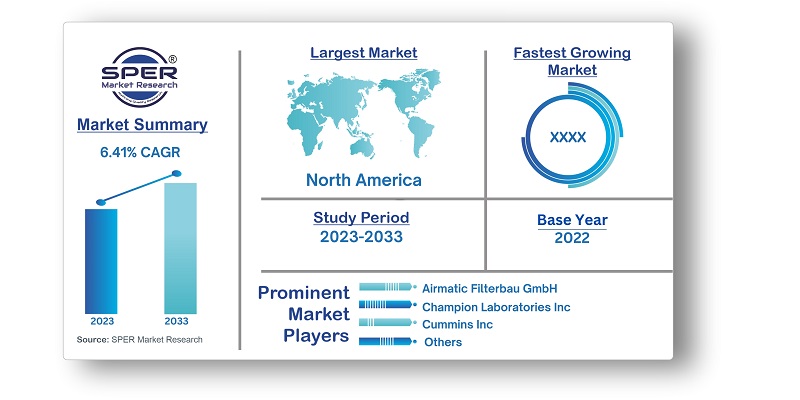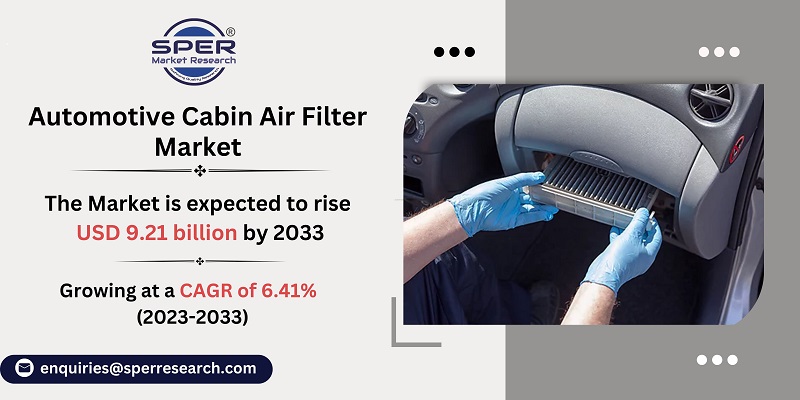
Automotive Cabin Air Filter Market Growth, Trends, Size, Demand, Revenue and Future Outlook
Automotive Cabin Air Filter Market Size- By Filter Medium, By Vehicle Type, By Sales Channel- Regional Outlook, Competitive Strategies and Segment Forecast to 2033
| Published: Nov-2023 | Report ID: AMIN23171 | Pages: 1 - 234 | Formats*: |
| Category : Automotive & Transportation | |||


| Report Metric | Details |
| Market size available for years | 2019-2033 |
| Base year considered | 2022 |
| Forecast period | 2023-2033 |
| Segments covered | By Filter Medium, By Vehicle Type, By Sales Channel |
| Regions covered | North America, Asia-Pacific, Latin America, Middle East & Africa and Europe |
| Companies Covered | Airmatic Filterbau GmbH, Champion Laboratories Inc., Cummins Inc., Denso Corporation, Donaldson Company Inc., FRAM Group IP LLC, Freudenberg & Co. KG, Hengst SE & Co. KG, K & N Engineering Inc., Mahle Group, Mann + Hummel GmbH, Robert Bosch GmbH, SOGEFI SpA, UFI Filters Spa, Others |
- Aftermarket Suppliers
- Automotive Manufacturers
- Automotive Repair and Service Centers
- Filter Manufacturers
- Fleet Operators
- Health and Safety Organizations
- Research and Development Institutions
- Others
| By Filter Medium: |
|
| By Sales Channel: |
|
| By Vehicle Type: |
|
- Global Automotive Cabin Air Filter Market Size (FY’2023-FY’2033)
- Overview of Global Automotive Cabin Air Filter Market
- Segmentation of Global Automotive Cabin Air Filter Market By Filter Medium (Cellulose Filters, Synthetic Filters)
- Segmentation of Global Automotive Cabin Air Filter Market By Vehicle Type (Compact Passenger Cars, Heavy Commercial Vehicles, Lawn Mowers, Light Commercial Vehicles, Luxury Passenger Cars, Mid-sized Passenger Cars, Off-road Vehicles, Powersports, Premium Passenger Cars)
- Segmentation of Global Automotive Cabin Air Filter Market By Sales Channel (IAM, OEMs, OESs)
- Statistical Snap of Global Automotive Cabin Air Filter Market
- Expansion Analysis of Global Automotive Cabin Air Filter Market
- Problems and Obstacles in Global Automotive Cabin Air Filter Market
- Competitive Landscape in the Global Automotive Cabin Air Filter Market
- Impact of COVID-19 and Demonetization on Global Automotive Cabin Air Filter Market
- Details on Current Investment in Global Automotive Cabin Air Filter Market
- Competitive Analysis of Global Automotive Cabin Air Filter Market
- Prominent Players in the Global Automotive Cabin Air Filter Market
- SWOT Analysis of Global Automotive Cabin Air Filter Market
- Global Automotive Cabin Air Filter Market Future Outlook and Projections (FY’2023-FY’2033)
- Recommendations from Analyst
1.1. Scope of the report1.2. Market segment analysis
2.1. Research data source2.1.1. Secondary Data2.1.2. Primary Data2.1.3. SPER’s internal database2.1.4. Premium insight from KOL’s2.2. Market size estimation2.2.1. Top-down and Bottom-up approach2.3. Data triangulation
4.1. Driver, Restraint, Opportunity and Challenges analysis4.1.1. Drivers4.1.2. Restraints4.1.3. Opportunities4.1.4. Challenges4.2. COVID-19 Impacts of the Global Automotive Cabin Air Filter Market
5.1. SWOT Analysis5.1.1. Strengths5.1.2. Weaknesses5.1.3. Opportunities5.1.4. Threats5.2. PESTEL Analysis5.2.1. Political Landscape5.2.2. Economic Landscape5.2.3. Social Landscape5.2.4. Technological Landscape5.2.5. Environmental Landscape5.2.6. Legal Landscape5.3. PORTER’s Five Forces5.3.1. Bargaining power of suppliers5.3.2. Bargaining power of buyers5.3.3. Threat of Substitute5.3.4. Threat of new entrant5.3.5. Competitive rivalry5.4. Heat Map Analysis
6.1. Global Automotive Cabin Air Filter Market Manufacturing Base Distribution, Sales Area, Product Type6.2. Mergers & Acquisitions, Partnerships, Product Launch, and Collaboration in Global Automotive Cabin Air Filter Market
7.1. Global Automotive Cabin Air Filter Market Value Share and Forecast, By Filter Medium, 2023-20337.2. Cellulose Filters7.3. Synthetic Filters
8.1. Global Automotive Cabin Air Filter Market Value Share and Forecast, By Vehicle Type, 2023-20338.2. Compact Passenger Cars8.3. Heavy Commercial Vehicles8.4. Lawn Mowers8.5. Light Commercial Vehicles8.6. Luxury Passenger Cars8.7. Mid-sized Passenger Cars8.8. Off-road Vehicles8.9. Powersports8.10. Premium Passenger Cars
9.1. Global Automotive Cabin Air Filter Market Value Share and Forecast, By Sales Channel, 2023-20339.2. IAM (Identity & Access Management)9.3. OEMs (Original Equipment Manufacturers)9.4. OESs (Original Equipment Suppliers)
10.1. Global Automotive Cabin Air Filter Market Size and Market Share
11.1. Global Automotive Cabin Air Filter Market Size and Market Share By Filter Medium (2019-2026)11.2. Global Automotive Cabin Air Filter Market Size and Market Share By Filter Medium (2027-2033)
12.1. Global Automotive Cabin Air Filter Market Size and Market Share By Vehicle Type (2019-2026)12.2. Global Automotive Cabin Air Filter Market Size and Market Share By Vehicle Type (2027-2033)
13.1. Global Automotive Cabin Air Filter Market Size and Market Share By Application (2019-2026)13.2. Global Automotive Cabin Air Filter Market Size and Market Share By Application (2027-2033)
14.1. Global Automotive Cabin Air Filter Market Size and Market Share By Sales Channel (2019-2026)14.2. Global Automotive Cabin Air Filter Market Size and Market Share By Sales Channel (2027-2033)
15.1. Global Automotive Cabin Air Filter Market Size and Market Share By Region (2019-2026)15.2. Global Automotive Cabin Air Filter Market Size and Market Share By Region (2027-2033)15.3. Asia-Pacific15.3.1. Australia15.3.2. China15.3.3. India15.3.4. Japan15.3.5. South Korea15.3.6. Rest of Asia-Pacific15.4. Europe15.4.1. France15.4.2. Germany15.4.3. Italy15.4.4. Spain15.4.5. United Kingdom15.4.6. Rest of Europe15.5. Middle East and Africa15.5.1. Kingdom of Saudi Arabia15.5.2. United Arab Emirates15.5.3. Rest of Middle East & Africa15.6. North America15.6.1. Canada15.6.2. Mexico15.6.3. United States15.7. Latin America15.7.1. Argentina15.7.2. Brazil15.7.3. Rest of Latin America
16.1. Airmatic Filterbau GmbH16.1.1. Company details16.1.2. Financial outlook16.1.3. Product summary16.1.4. Recent developments16.2. Champion Laboratories Inc.16.2.1. Company details16.2.2. Financial outlook16.2.3. Product summary16.2.4. Recent developments16.3. Cummins Inc.16.3.1. Company details16.3.2. Financial outlook16.3.3. Product summary16.3.4. Recent developments16.4. Denso Corporation16.4.1. Company details16.4.2. Financial outlook16.4.3. Product summary16.4.4. Recent developments16.5. Donaldson Company Inc.16.5.1. Company details16.5.2. Financial outlook16.5.3. Product summary
16.5.4. Recent developments
16.6. FRAM Group IP LLC16.6.1. Company details16.6.2. Financial outlook16.6.3. Product summary16.6.4. Recent developments16.7. Freudenberg & Co. KG16.7.1. Company details16.7.2. Financial outlook16.7.3. Product summary16.7.4. Recent developments16.8. Hengst SE & Co. KG16.8.1. Company details16.8.2. Financial outlook16.8.3. Product summary16.8.4. Recent developments16.9. K & N Engineering Inc.16.9.1. Company details16.9.2. Financial outlook16.9.3. Product summary16.9.4. Recent developments16.10. Mahle Group16.10.1. Company details16.10.2. Financial outlook16.10.3. Product summary16.10.4. Recent developments16.11. Mann + Hummel GmbH16.11.1. Company details16.11.2. Financial outlook16.11.3. Product summary16.11.4. Recent developments16.12. Robert Bosch GmbH16.12.1. Company details16.12.2. Financial outlook16.12.3. Product summary16.12.4. Recent developments16.13. SOGEFI SpA16.13.1. Company details16.13.2. Financial outlook16.13.3. Product summary16.13.4. Recent developments16.14. UFI Filters Spa16.14.1. Company details16.14.2. Financial outlook16.14.3. Product summary16.14.4. Recent developments16.15. Others
SPER Market Research’s methodology uses great emphasis on primary research to ensure that the market intelligence insights are up to date, reliable and accurate. Primary interviews are done with players involved in each phase of a supply chain to analyze the market forecasting. The secondary research method is used to help you fully understand how the future markets and the spending patterns look likes.
The report is based on in-depth qualitative and quantitative analysis of the Product Market. The quantitative analysis involves the application of various projection and sampling techniques. The qualitative analysis involves primary interviews, surveys, and vendor briefings. The data gathered as a result of these processes are validated through experts opinion. Our research methodology entails an ideal mixture of primary and secondary initiatives.



Frequently Asked Questions About This Report
PLACE AN ORDER
Year End Discount
Sample Report
Pre-Purchase Inquiry
NEED CUSTOMIZATION?
Request CustomizationCALL OR EMAIL US
100% Secure Payment






Related Reports
Our Global Clients
Our data-driven insights have influenced the strategy of 200+ reputed companies across the globe.




















